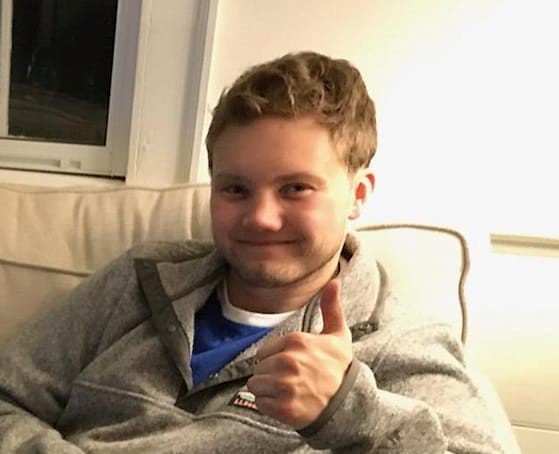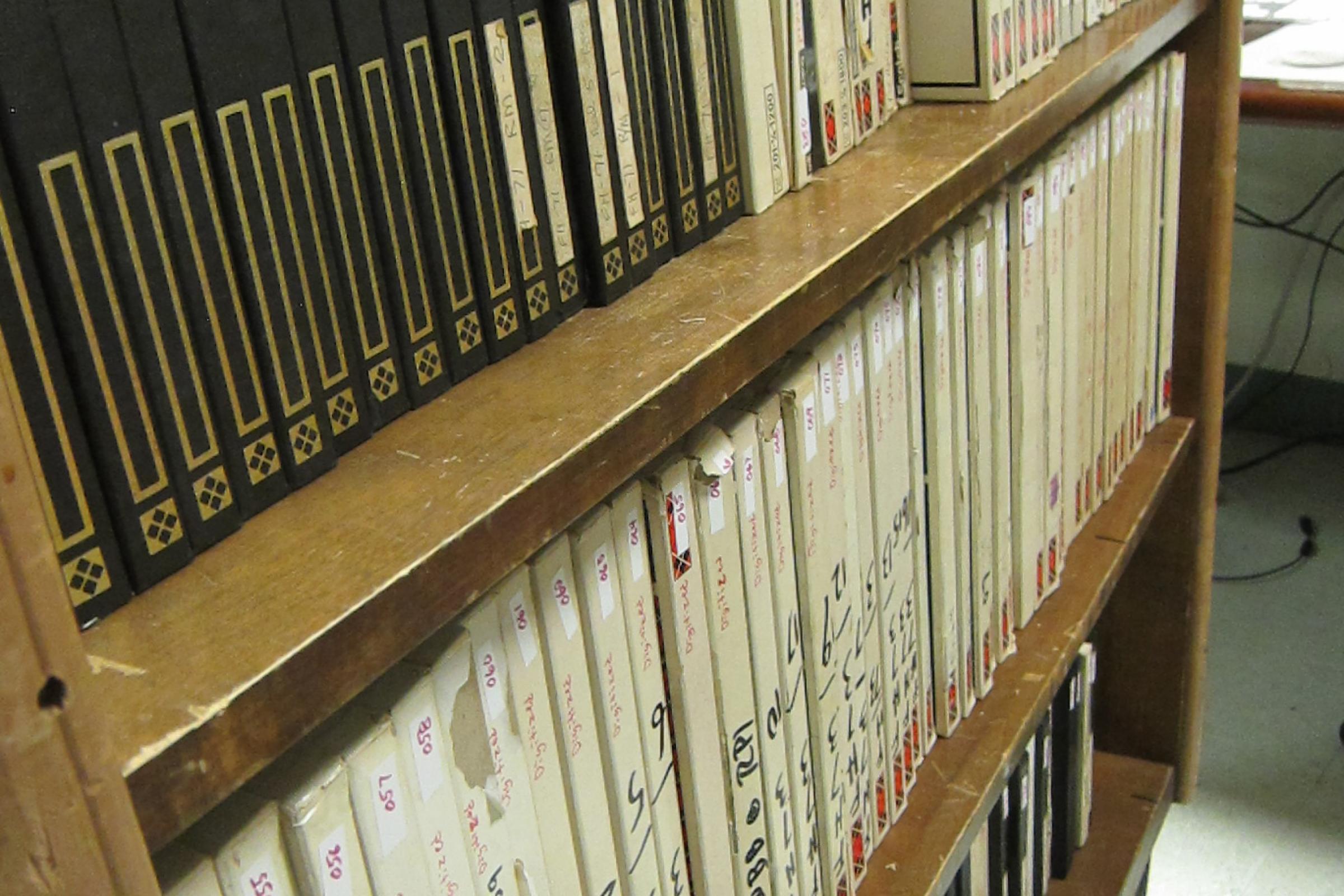This summer, I interned at the M.E. Grenander Department of Special Collections & Archives, working under the supervision of Mark Wolfe, Curator of Digital Collections. My job was to listen to and create descriptive metadata for a recently acquired collection of audio recordings attached to the Bill and Andy Spence Papers. The recordings were received by the Archives as reel-to-reel audio tapes and sent out to a vendor for digitization

Aaron Bradt
I began my internship on May 25, 2021, with a trip to the Archives to photograph the boxes used to house the reel-to-reel tapes. I wanted to capture any identifying information written on the boxes, such as recording years and musicians. The photographing took two trips to complete. Afterwards I received copies of the digitized recordings and the metadata spreadsheet and began listening to and describing them. Unfortunately, most of the recordings and the labels on their boxes did not match. Although I was able to match many of them up, in some cases it was not possible, as they were copies of other recordings or in some cases duplicates. I color coded the metadata spreadsheet to make it easy to distinguish recordings that are copies.
The main goal of the internship was for me to create descriptive metadata so the Archives can provide access to the recordings online. In fifty to a hundred words, I described the musicians names, songs, and location for each audio recording. I also recorded additional identifying information such as file size, duration, format, date, and subject headings from the Library of Congress.
The recordings vary in length from nine minutes and thirty-six seconds to one hour and thirty-seven minutes and have varying sound quality. It is also incredibly important to remember that each recording has two ways to identify it: a designated file name and a physical number placed on each box by the Archives.
My secondary task was to conduct background research on the Fox Hollow Folk Festival and the musicians who performed there to supplement the notes taken while listening to the recordings. In researching the Fox Hollow Folk Festival, I was able to contact three musicians who performed at the festival, John Roberts, Mark Rust, and Chris Shaw. They provided invaluable information about how the festival was run and the names of other musicians who I could only identify by first name and/or a few letters of their last names.
Beginning in 1966, Bob and Evelyne Beers ran the Fox Hollow Folk Festival at their estate in Petersburgh, NY. The Beers were themselves traveling musicians who would invite other musicians they liked to perform at their festival. (J. Roberts, personal correspondence, July 2, 2021)
Despite not being well known today, the Fox Hollow Folk Festival was incredibly popular. The Beers were able to attract some of the biggest names in American folk music to the Hudson Valley. Musicians such as Pete Seeger, Michael Cooney, Jean Ritchie, and Tom Paxton featured at the festival for many years. In addition to American musicians, the Beers were able to attract folk musicians from Canada and the United Kingdom.
Once at the festival, the musicians were never certain when they would perform, as John Roberts told me, musicians were usually asked to do a set after whomever was going on next giving about 15 to 30 minutes of preparation. (J. Roberts, personal communication, July 2, 2021) Bob Beers died in 1972 (The New York Times, 1972), but the festival lived on until 1980 faithfully run by Evelyne Beers with assistance from Don Bernstine and Andy Spence. (Winters, 2004) New York’s Capital Region has retained a folk music festival through the Old Songs Festival held in Altamont, NY, which began in 1981 and features many of the same musicians.
The collection contains more than recordings from Fox Hollow: it has recordings from Spring Folk Sampler concerts held in Delmar, NY, and recordings from a testimonial concert for Lena Spencer, founder of Café Lena in Saratoga Springs, NY. Additionally, there are recordings from the radio stations of both Rensselaer Polytechnic Institute and UAlbany, as well as a lecture by Karl Hess. The recording from UAlbany is a reel-to-reel copy of the record a student found in a 1973 UAlbany yearbook in 2019. The recording is from 1973 of a phony radio broadcast. It is unclear if this audio reel is the original or just another copy. There are also studio recordings of several musicians, some of whom do not play folk music and are unidentified. While these recordings do not relate to Fox Hollow or Old Songs, they are interesting to hear and may provide information about Bill and Andy Spence’s musical interests. Or they could have been mixed in by accident by Don Person who held onto the audio reels for the Spences.
Bill and Andy Spence
My internship project was an incredibly valuable learning experience and gave me better insight as to what professional archivists do. Writing short descriptions of each recording forced me to consider what information is really identifying and should be included to increase findability within the collection and Archives. I also learned how to search the Library of Congress Subject Headings List and apply them to my work. Because I was unfamiliar with much of the music and the musicians performing at the beginning, I constantly had to go back and update descriptions and subject headings to include the names I could not identify at my first listening. Besides listening to the recordings and contacting past Fox Hollow performers, I was able to utilize Newspapers.com with access through UAlbany. A simple search for the festival on Newspapers.com brings results from articles in papers all over the country.
All three musicians I spoke to have been thrilled that the festival is being archived in some way. Communicating with them has been the interesting part of my internship and helped me be much more specific with my descriptions.
While taking part in this internship I had the great fortune of taking a digital libraries class taught by Mark Wolfe. Taking this course while interning at the Archives was incredibly helpful. One of the topics covered was the proper naming of files and the importance of a standardized naming convention. Standardization is highly important when organizing a digital collection to ensure compatibility between computer systems and to assist in finding archival material. We also discussed metadata and its importance to organization and finding aids within a collection or database. Another important topic we covered was digitization. While I was not responsible for digitizing the audio reels, it is good to know the specifications that are recommended for digitizing text, audio, and visual materials. For example, the best file type to use when creating digital audio is a WAV file format for preservation purposes, the recordings I listened to are all access files, using the MP3 file format. Despite not being directly related to my internship project the coursework for digital libraries very helpful while completing it.
This internship has given me experience creating metadata for archival resources and performing the research necessary to effectively describe them. After graduation, I plan to work in either an archive or museum as I also have a master’s degree in public history. I hope to be able to utilize both skillsets to catalog, preserve, interpret, and provide access to information resources whether they belong in an archive or museum. Museums and archives are essential to the preservation of history and to help people learn in non-traditional settings. I plan to be a part of that community that preserves and promotes history.
Interning at the M.E. Grenander Special Collections and Archives has been an excellent experience. It has given me greater insight into the daily work of archivists and greater appreciation for standardized organization and labeling. It was a great frustration to find that many of the audio reels and the boxes they are in do not match. My work will hopefully make them much easier to identify. I also hope that when members of the folk music community listen to the recordings that they can help identify musicians that I was unable to. The Fox Hollow Folk Festival was highly popular and a big event in the capital region for 14 years. I am very happy to have had the opportunity to listen to the recently digitized recordings, help catalog the collection, and tell some of the musicians where they can listen to it once it is online.
Bibliography
Winters, S. (2004). Profiles in Folk. Archive.today. https://archive.is/20120918073821/http://www.wshu.org/profiles/2004/pr0406…;
The New York Times. (1972, May 27). ROBERT BEERS DEAD; FOLK SINGER WAS 51. The New York Times. https://www.nytimes.com/1972/05/27/archives/robert-beers-dead-folk-singer-….
